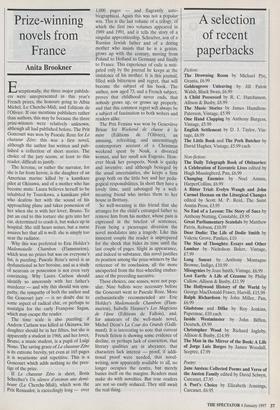Prize-winning novels from France
Anita Brookner
Exceptionally, the three major publish- ers were unrepresented in this year's French prizes, the honours going to Albin Michel, Le Cherche-Midi, and. Editions de l'Olivier. If one mentions publishers rather than authors, this may be because the three prize-winners were relatively unknown, although all had published before. The Prix Goncourt was won by Pascale Roze for Le chasseur Zero: this was a first novel, although the author has written and pub- lished a collection of short stories. The choice of the jury seems, at least to this reader, difficult to justify.
The heroine, or rather the narrator, for she is far from heroic, is the daughter of an American marine killed by a kamikaze pilot at Okinawa, and of a mother who has become mute. Laura believes herself to be inhabited by Tsurokawa, a kamikaze pilot who deafens her with the sound of his approaching plane and takes possession of her when she is with her lover, Bruno. To put an end to this torture she gets into her car, determined to crash it, but wakes up in hospital. She still hears noises, but a nurse assures her that all is well: she is simply too near the radiator.
Why this was preferred to Eric Holder's Mademoiselle Chambon (Flammarion), which won no prizes but was on everyone's list, is puzzling. Pascale Roze's novel is as dysfunctional as her heroine, and as a study of neurosis or possession is not even very convincing. Why Laura Carlson should identify so amorously with her father's murderer — and why this should win sym- pathy, the sympathy of both the author and the Goncourt jury — is no doubt due to some aspect of radical chic, or perhaps to nostalgia for the early Francoise Sagan, which may escape the reader. The time scale is also puzzling: if Andrew Carlson was killed at Okinawa, his daughter should be in her fifties, but she is apparently a student in 1968, and her lover, Bruno, a music student, is a pupil of Luigi Nono. The saving grace of Le chasseur Zero is its extreme brevity, yet even at 165 pages it is wearisome and repetitive. This is a Goncourt which adds nothing to the pres- tige of the prize. If Le chasseur Zero is short, Boris Schreiber's Un silence d'environ une demi- heure (Le Cherche-Midi), which won the Prix Renaudot, is exceedingly long — over 1,000 pages — and flagrantly auto- biographical. Again this was not a popular win. This is the last volume of a trilogy, of which the first two volumes appeared in 1989 and 1991, and it tells the story of a singular apprenticeship. Schrieber, son of a Russian Jewish father and of a doting mother who insists that he is a genius, grows up with the century, moving from Poland to Holland to Germany and finally to France. This experience of exile is miti- gated only by the journal he keeps at the insistence of his mother. It is this journal, filled with bitterness and regret, that will become the subject of his book. The author, now aged 73, and a French subject, proves that childhood never ends, that nobody grows up, or grows up properly, and that this common regret will always be a subject of fascination to both writers and readers alike.
The Prix Femina was won by Genevieve Brisac for Weekend de chasse a la mere (Editions de l'Olivier), an amusing, refreshing, and unremittingly contemporary account of a Christmas weekend spent by Nouk, a divorced woman, and her small son Eugenio. How- ever bleak her prospects, Nouk is quirky and inventive, and although besieged by the usual uncertainties, she keeps a firrn grasp both on the little boy and her peda- gogical responsibilities. In short they have a lovely time, until sabotaged by a well- meaning friend who invites them to her house in Brittany.
So well-meaning is this friend that she arranges for the child's estranged father to remove him from his mother, whose pain is expressed in the briefest of sentences. From being a picaresque diversion the novel modulates into a tragedy. Like this innocent couple the reader is unprepared for the shock that bides its time until the last couple of pages. Slight in appearance, and indeed in substance, this novel justifies its position among the prize-winners by the reticence of its conclusion, all the more unexpected from the free-wheeling exuber- ance of the preceding narrative.
These choices, one senses, were not pop- ular. Nine ballots were necessary before the Goncourt went to Pascale Roze. More enthusiastically recommended are Eric Holder's Mademoiselle Chambon (Flam- marion), Isabelle Hausser's Les Magiciens de fame (Editions de Fallois), and, for amateurs of the well-made novel, Michel Deon's La Cour des Grands (Galli- mard). It is interesting to note that current French fiction is showing some evidence of decline, or perhaps lack of conviction, that literary qualities are in abeyance, that characters lack interest — proof, if addi- tional proof were needed, that novel- writing, now apparently available to all, no longer occupies the centre, but merely busies itself on the margins. Readers must make do with novelties. But true readers are not so easily seduced. They still await the real thing.


























































 Previous page
Previous page